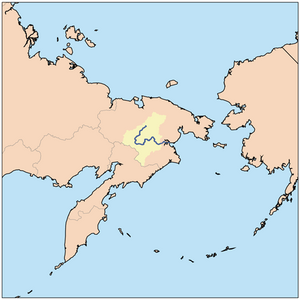Anadyrsk facts for kids
Anadyrsk was an important Russian fort, known as an ostrog (pronounced: OSS-trog), in the far northeastern part of Siberia. It was a strong, walled settlement that existed from 1649 to 1764. Anadyrsk was located on the Anadyr River, a long way upstream from the ocean. It was about 12 miles northeast of where the town of Markovo is today.
Contents
History of Anadyrsk
How Anadyrsk Started
In 1649, a famous explorer named Semyon Dezhnyov built a zimov'ye (a type of winter camp) in this area. He had been shipwrecked on the Pacific coast the year before. Soon after, in 1650, other explorers like Mikhail Stadukhin and Semyon Motora arrived overland.
Growing into a Fort
Later, in 1659, Kurbat Ivanov took charge. He made the settlement much stronger by building a proper wooden wall, called a stockade. He also improved how the fort was managed. Anadyrsk became a key place for Russia's expansion into new lands.
Anadyrsk's Role in Exploration
Around 1697, Anadyrsk was the starting point for Vladimir Atlasov's journey to conquer the Kamchatka region. This shows how important Anadyrsk was for Russian explorers and their missions.
Challenges and Conflicts
The local people, especially the Chukchis and Koryaks, were strong and brave. They often fought against the Russian settlers. Anadyrsk was attacked many times. To protect the fort, it had a large group of soldiers, sometimes as many as 600 men, and even cannons.
Why Anadyrsk Declined
Anadyrsk's importance began to fade after 1718. This was because a new sea route opened up through Okhotsk to Kamchatka. This new route made it easier and faster to travel, so Anadyrsk was no longer the main gateway. After this, its main purpose was dealing with the Chukchi people.
The Russian government, led by Empress Catherine II, eventually decided that trying to collect taxes or tribute from the Chukchis was not worth the effort. So, in 1764, they ordered Anadyrsk to be abandoned.
Anadyrsk in Later Years
A Visit in 1866
In 1866, an American explorer named George Kennan visited the area. He was one of the very few non-Russians or non-natives to visit Anadyrsk at that time. He found that Anadyrsk was no longer a single fort but a group of four small villages.
The Villages of Anadyrsk
The main village was Markovo. The other villages were Pokorukov, Psolkin, and Krepost. Krepost, which means 'fort' in Russian, was where the old Anadyrsk fort used to stand. By 1866, there were no signs of the old fortifications left. The area had about 200 people living there, including a priest. Kennan described Anadyrsk as being at the very edge of Russian civilization.
 | Victor J. Glover |
 | Yvonne Cagle |
 | Jeanette Epps |
 | Bernard A. Harris Jr. |


